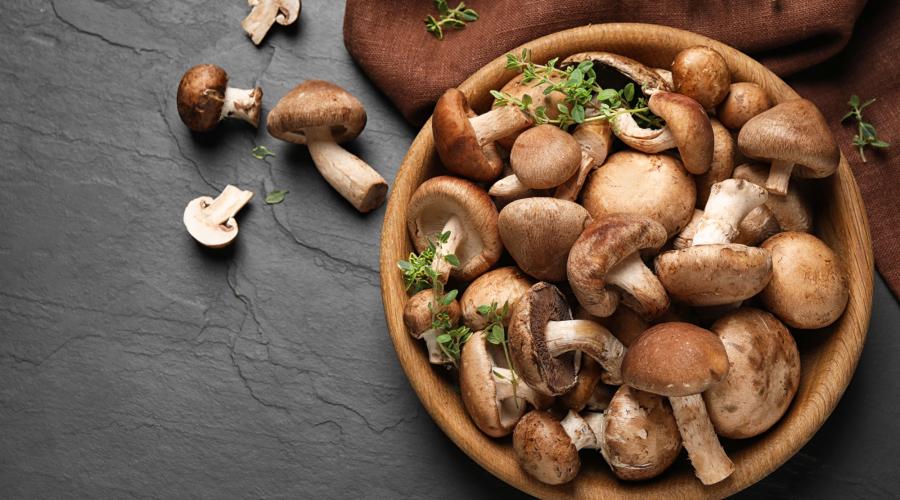
Mushrooms are technically a fungi, but are classified as a vegetable for nutritional purposes. Thanks to the rising popularity of meat-free or vegan diets, the mushroom has become a popular meat replacement choice, and rightfully so. With so many different shapes, sizes, colors, and flavors, mushrooms can be seamlessly incorporated into just about any meal. Along with their versatility, mushrooms also provide important nutrients for your body. Read on to learn more about the health benefits of mushrooms.
Top Health Benefits of Mushrooms
Fuel Your Body
Mushrooms contain several types of B vitamins, including riboflavin, niacin, folate, and pantothenic acid.2 These vitamins have many positive benefits, and can impact your brain function, cell metabolism, and energy levels. B vitamins can also help promote proper nerve function, muscle tone, and cardiovascular health.3
May Lower Your Blood Glucose Levels
A cup of raw mushrooms provides almost 1 gram of dietary fiber.4 By adding more mushrooms (and therefore more fiber) to your diet, you could lower your risk of developing type 2 diabetes. If you already have type 2 diabetes, eating the right levels of dietary fiber could lower your blood glucose levels.5
Protect Your Brain Function
Mushrooms contain two antioxidants: ergothioneine and glutathione.6 According to a recent study, consuming these two antioxidants in mushrooms could reduce mild cognitive impairment, which is often a precursor to Alzheimer’s disease.7
Strengthen Your Bones
Mushrooms are one of the best food sources for vitamin D2, which contributes to maintaining strong bones.8 In animal studies, consuming mushrooms helped decrease bone loss in osteoporatiatic animals.9, 10 More research is needed on humans to determine mushroom’s effect on individuals with osteoporosis.
Delicious & Healthy Mushroom Recipes
With so many different types of mushrooms, there’s an almost endless amount of ways to prepare them. For a low-effort serving of vegetables, try adding them to your next omelette, soup, salad, or pizza. When sauteed with garlic and other herbs , mushrooms can compliment just about any dish. Or, let mushrooms be the main event by using them as a meat substitute. Try pairing roasted teriyaki mushrooms with soba noodles, or grill up some portobello mushroom burgers at your next barbeque.
Thanks to their versatility, there are many ways to incorporate mushrooms into your balanced diet. Experiment with different varieties (like shiitake, cremini, button, or portobello) to see what you like best!
1 https://www.ncbi.nlm.nih.gov/pmc/articles/PMC4244211/
3 https://www.healthline.com/health/food-nutrition/vitamin-b-complex#benefits
4 https://www.medicalnewstoday.com/articles/278858#benefits
5 https://www.ncbi.nlm.nih.gov/pmc/articles/PMC5883628/
6 https://www.sciencedirect.com/science/article/abs/pii/S030881461730691X?via%3Dihub
7 https://content.iospress.com/articles/journal-of-alzheimers-disease/jad180959
8 https://www.webmd.com/drugs/2/drug-8604/ergocalciferol-vitamin-d2-oral/details
9 https://pubmed.ncbi.nlm.nih.gov/27649725/
10 https://pubmed.ncbi.nlm.nih.gov/25792284/












